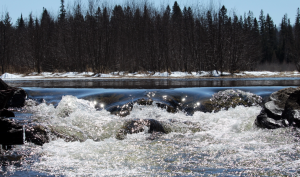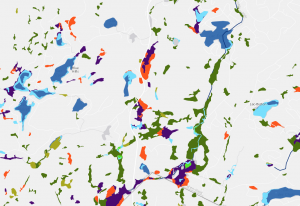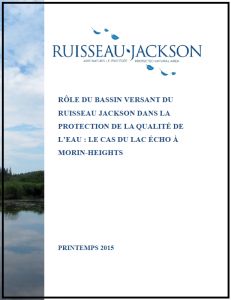Ecosystem goods and services (EGS) are the benefits that society gains through the different ecosystem functions. The concept of EGS is fairly recent and environmental experts are just beginning to use it. But, as always, Ruisseau Jackson is ahead of the curve! As early as 2015, we were looking into this for our zone of interest.
An ecosystem good may be a natural resource such as wood, an ore or a plant. It’s something to which we often attach a dollar value. An ecosystem service is air quality, for instance, or the scenic beauty of the landscape, pollination, climate regulation or water filtration. They are more difficult to account for since none of the world’s markets trade them as stocks. Still, EGS benefits may be translated into dollar amounts, and this helps many people better understand the tremendous value of natural environments.
More information is available here (in French).
Money talks … to the tune of $6.5M a year!
Considering the entire area of wetlands and forests in RJANP, the total economic value of the water purification work ensured by Mother Nature totals $6.5M per year. This figure includes the specific roles that wetlands, waterways, bodies of water and forests play in protecting water quality. The ecosystem services of the wetlands alone are evaluated at some $1.7M annually.
For aspiring economists
In 2015, Ruisseau Jackson aire naturelle protégée (RJANP) released a report on the ecosystem services provided by the territory’s natural environments across the entire community.
With regard to Ruisseau Jackson and its watershed, the report explored the role of the natural environment in regulating and maintaining water quality. The aim was to estimate the monetary value of these services:
- Water regulation (flow control)
- Waste treatment
- Erosion control
- Sediment retention
- Nutrient cycle balance
Case study: Lac Écho
As it constitutes the area’s main body of water and is located downstream of the RJANP territory, Lac Écho was chosen to illustrate the local environmental benefits.
Lac Écho’s renewal time is 0.05 year. This means that the lake’s total volume is, on average, renewed over an 18-day period. This also means that the water quality is highly dependent on the quality of the water in its tributaries. The water regulation services that the watershed provides are therefore essential to maintain the constant feed of quality water.
Wetlands and filtration services
The territory’s wetlands are critical to maintain water quality. Though the report addresses a range of environments on the territory, the following excerpt provides a particularly illustrative example.
“The water filtration services that the wetlands of the Ruisseau Jackson watershed provide are vital to protect water quality. Point-source contamination—from wastewater from an outdated septic system or sediments from a ditch or even a pit or quarry site, for example—could occur at several locations across the territory. These realities arise often, even within the Ruisseau Jackson watershed, which is in a low-populated area. Because they filter, accumulate and absorb these pollutants, the watershed’s wetlands help reduce the extent of the contamination, thus avoiding the investment of major sums.”
Decision-making tool
The association, municipalities, developers and landowners could easily account for the value of the services rendered by the natural environment when setting out strategic directions for land use and development.
As early as 2014, following his visit to Ruisseau Jackson, Peter Bridgewater, former secretary general of the Ramsar Convention on the Protection of Wetlands of International Importance had this to say about RJANP: “The landscape is not only wild and beautiful, but it provides other ecosystem services to local residents, as well as those living further away. One of the most obvious is protecting, purifying and producing water of high quality.”



